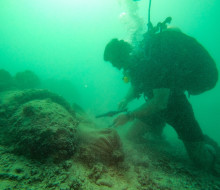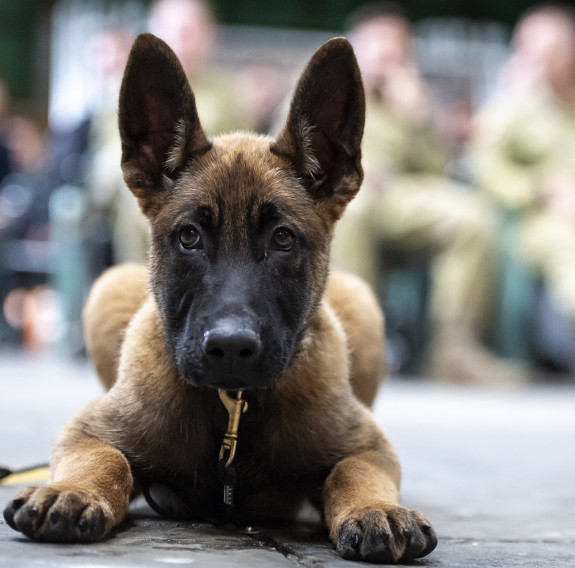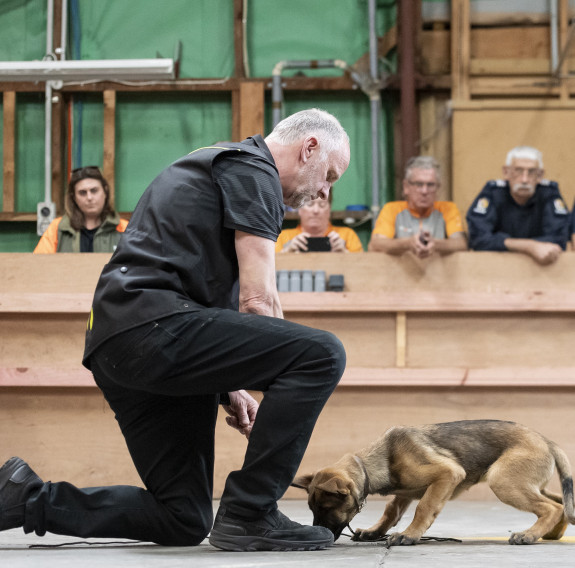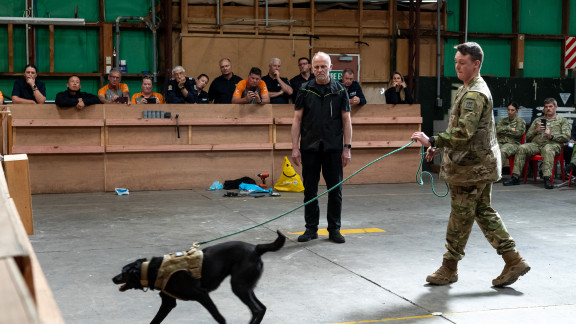
Second World War-era bombs in Vanuatu made safe by Navy divers
26 June 2024
Unfortunately you are viewing this website on an outdated browser which does not support the necessary features for us to provide an adequate experience. Please switch to a modern browser such as latest version of Google Chrome, Mozilla Firefox, Apple Safari or Microsoft Edge.
Ngā mihi nui
A seminar on training working dogs wrapped up at Trentham recently after hosting around 170 dog handlers from Government and non-Government organisations.
The New Zealand Defence Force (NZDF) and New Zealand Police hosted the nine day seminar.
For the NZDF, Military Working Dogs (MWD) are one of its frontline capabilities and covers tasks across explosive detection, tracking, security patrols and much more.
Training dogs for those tasks takes a huge amount of effort on the part of the dog and its handler.
Dutch dog trainer Dick Staal’s been training working dogs since 1977 and was invited to run the working dog seminars.
The NZDF’s Working Military Dog Capability Manager, Alan Inkpen, organised the event and said it was a rare opportunity to bring some of New Zealand’s working dog handlers together for a collective benefit.
“Mr Staal is one of the few trainers around the world able to offer a complete training portfolio across all of our capabilities. For example, the first detection dog seminar was targeted towards our explosive detection dogs, but also other government agencies that use dogs for their own detection purposes.”

Puppies of all breeds and from a variety of government and non-government agencies honed their skills as part of the puppy development seminar
NZDF Military Working Dogs being tested across various terrain as they tracked a human scent

Dutch trainer Dick Staal brought his decades of experience to put dogs through their detection paces
NZDF Military Working Dogs being tested across various terrain as they tracked a human scent
The second seminar focused on puppy development, which saw dogs put through their paces on a range of tasks, including how to imprint particular smells geared to that dog’s future role - whether that be to detect illegal narcotics, money or smuggled bananas on the border.
Puppy development is an area where Mr Staal’s training methodology differs from some traditional techniques.
“[People would] often say that you have to train your dog after one year; that in my opinion is a big mistake. You can start training a puppy when it is eight weeks old in a positive way,” said Mr Staal.
The final seminar, which wrapped up this week, tested the dogs’ tracking abilities across multiple scenarios, including following a human scent through various grass and hard surface tracks.
National Coordinator for Police Dogs, Inspector Todd Southall, said the seminars were an invaluable opportunity to network with other agencies.
“There’s pretty much every New Zealand working dog agency represented here as well as representation from Australian Police and the Australian Defence Force (ADF),” he said.
Having members of the ADF attend was particularly important for the NZDF, as it created a prime opportunity to work alongside personnel from New Zealand’s ally.
“The chances of us deploying on a mission where there's going to be a coalition between the ADF and ourselves is very high,” said Mr Inkpen.
“That’s where seminars like these just help break down those barriers before any future deployments - because that interoperability is really important.”
Mr Staal was impressed with what he saw.
“I see very good working dogs here, so it’s not that they (handlers) are not doing things well, but they can maybe pick up some extra things here or there to make their dogs even better,” he said.
That was certainly the case for Police, according to Inspector Southall.
“There are little things we’ve picked up here that we’ll introduce - particularly around puppy development. But overall I think the positive is that we’re actually doing a good job in our training across the board.”
Mr Inkpen agreed, and said it was nice to have their hard work acknowledged by a leading expert in the field.
“It’s always good thinking that we know we're doing well, but it's nice when somebody of his knowledge and stature gives us those extra ticks in the box.
“I think we sometimes have to fly the flag and say we are good at what we do.”

Working Dog Seminar | New Zealand Defence Force